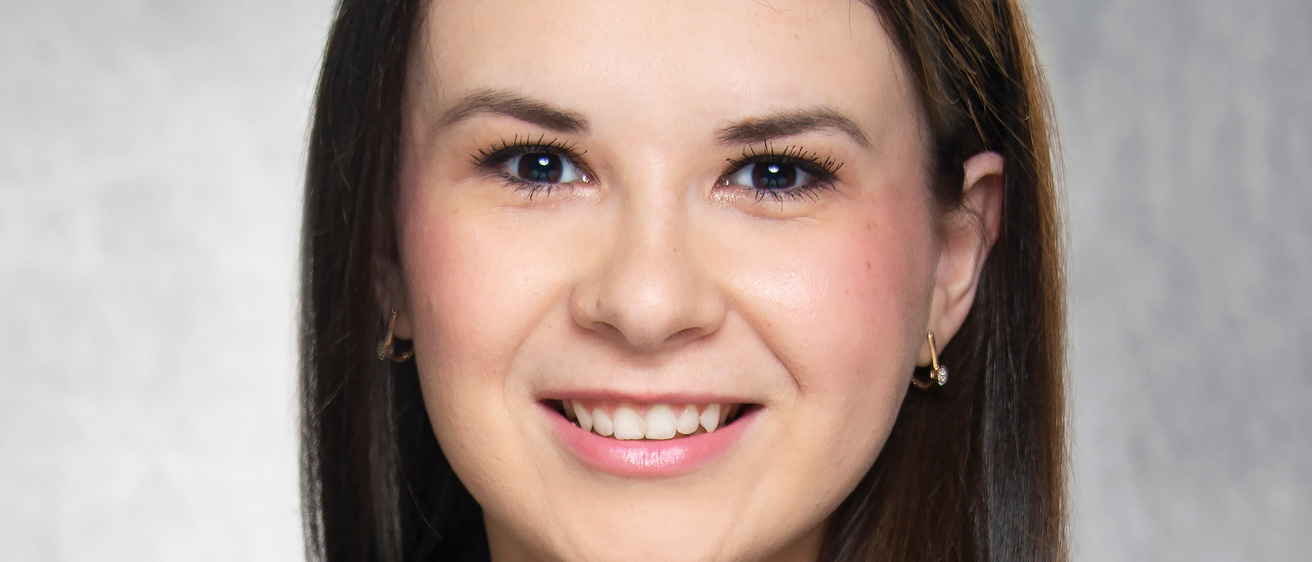Victoria Vivtcharenko (23MD) of Waukon, Iowa, explored research topics from a variety of medical specialties during her time in the Research Distinction Track. Even as her areas of focus changed, she stuck with her first research mentor: Caesar de Caesar Netto, MD, PhD, assistant professor of orthopedics and rehabilitation.
“He is an excellent orthopedic surgeon and researcher,” Vivtcharenko says. "He had just started his lab at Iowa when they purchased a new instrument called a 3D weight-bearing CT scanner. It is one of very few in the world.”
The scanner allows researchers to view the anatomy of the foot and ankle while a patient is in a natural standing position, when they are most likely to experience symptoms of their condition.
“We created distance maps and coverage maps to look at the relationship of the bones and see what changed in different conditions,” she says. “I also helped with some studies to evaluate surgical techniques.”
Vivtcharenko’s work with de Cesar Netto resulted in six publications in peer-reviewed journals and several national and international conference presentations, but she knew that she ultimately wanted to be in pediatrics. She got connected with Tina Cifra, MD, MS, who now works as an intensivist at Boston Children’s Hospital.
“We worked on a qualitative and quantitative study of diagnosis documentation in the pediatric intensive care unit (PICU), focused on how physicians document their reasoning,” she says. “A unique piece we looked at was uncertainty: Did anyone include that they weren’t sure what was going on with the patient? This is important because people primarily use notes to move the treatment plan forward, especially in busy units like the PICU.”
The project yielded interesting results, and she found it also enhanced her own skills as a future clinician.
“It reminds me to be more thoughtful in explaining my own reasoning in notes, so the person who reads it next can understand what's going on,” Vivtcharenko says. "That decreases some of the risk.”
The resulting publication in the journal Pediatric Critical Care Medicine was chosen as an Editor’s Choice paper. The project also won Best Scientific Poster at the Society to Improve Diagnosis in Medicine conference.
She also became interested in neurology as a subspecialty and began working with Katherine Matthews, MD, to study Duchenne and Becker muscular dystrophies. The disorders cause muscle weakness, cognitive differences, and mental health disorders, but their connection to seizures is less understood.
“Some small studies have shown that these patients do have seizures more often, so we’re doing a multi-site study to increase the number of patients and look at specific genetic mutations,” Vivtcharenko says.
In March of 2023, Vivtcharenko matched to a residency training program in child neurology at Boston Children’s Hospital.
“It was my number one choice,” she says. “I developed my research skills by participating in this track, and ultimately it has resulted in me getting accepted to the top program for child neurology. It was brought up in several of my residency interviews."
She plans to continue working on the Duchenne and Becker research project during her residency training.
"I'm interested in pursuing an academic career. This track provided a very structured, yet flexible avenue to pursue my research interests,” she says. “Being a physician, you get to always learn."
The Research Distinction Track
Learn about the application process, requirements, and opportunities available through the Research Distinction Track at the University of Iowa Carver College of Medicine.
